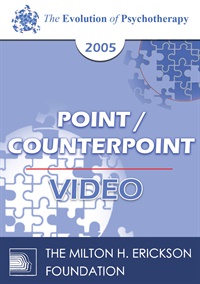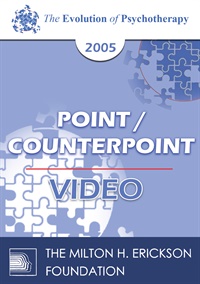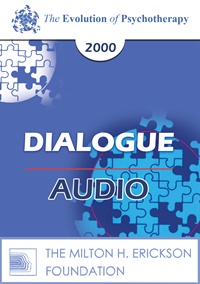
- Average Rating:
- Not yet rated
- Topic Areas:
- Psychotherapy | Dialogues | Point/Counterpoint Sessions
- Categories:
- Evolution of Psychotherapy | Evolution of Psychotherapy 2000 | Pioneers in Couples and Family Therapy
- Faculty:
- Jay Haley, MA | Erving Polster, PhD
- Course Levels:
- Master Degree or Higher in Health-Related Field
- Duration:
- 55:53
- Format:
- Audio Only
- Original Program Date:
- May 27, 2000
- Short Description:
- An in-depth discussion about the similarities and contrasts across major therapeutic approaches, highlighting principles such as point counterpoint, dimensionalism, personal style, and repertoire. The discussion emphasizes varying levels of directiveness in therapy, the importance of quality client connection, and the balance between art and theory. Additional topics include the evolving nature of psychotherapy and the need to adapt methods to diverse cultural and social contexts. Moderated by Ruth McClendon, M.S.W.
- Price:
- $15.00 - Base Price
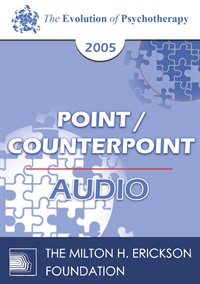
- Average Rating:
- Not yet rated
- Topic Areas:
- Point/Counterpoint Sessions | Post-Traumatic Stress Disorder (PTSD) | Psychotherapy | Storytelling | Constructive Narrative
- Categories:
- Evolution of Psychotherapy | Evolution of Psychotherapy 2005
- Faculty:
- Donald Meichenbaum, PhD | Michael White, B.A.S.W.
- Duration:
- 1 Hour 2 Minutes
- Format:
- Audio Only
- Original Program Date:
- Dec 07, 2005
- Short Description:
- An example of how a Constructive Narrative Perspective (CNP) can be used to explain the persistence of Post-traumatic Disorder and the treatment implications will be offered. Research implications for using a CNP will be examined.
- Price:
- $15.00 - Base Price
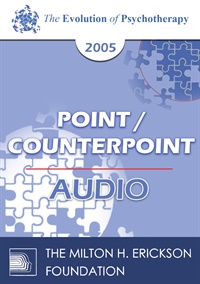
EP05 Point/Counterpoint 02 - Defining Mental Health as a Public Health Problem - William Glasser, MD
- Average Rating:
- Not yet rated
- Topic Areas:
- Point/Counterpoint Sessions | Choice Theory | Psychotherapy
- Categories:
- Evolution of Psychotherapy | Evolution of Psychotherapy 2005
- Faculty:
- William Glasser, MD | Mary Goulding, MSW
- Duration:
- 1 Hour 19 Minutes
- Format:
- Audio Only
- Original Program Date:
- Dec 07, 2005
- Short Description:
- Dr. Glasser will explain that there is such as entity as mental health and will define it in such a way that it is completely separated from what is now called mental illness and collected in the DSM-IV. He believes that by using Choice Theory, clients can be taught how to improve their own mental health. By doing this the medical model is no longer needed and should be replaced by a public health model.
- Price:
- $15.00 - Base Price
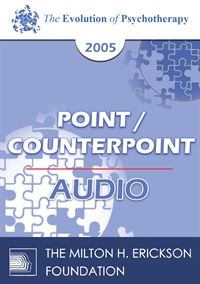
- Average Rating:
- Not yet rated
- Topic Areas:
- Point/Counterpoint Sessions | Hypnosis | Psychotherapy | Neuroscience
- Categories:
- Evolution of Psychotherapy | Evolution of Psychotherapy 2005
- Faculty:
- Ernest Rossi, PhD | Jean Houston, PhD
- Duration:
- 1 Hour 18 Minutes
- Format:
- Audio Only
- Original Program Date:
- Dec 07, 2005
- Short Description:
- The Molecular-Genomic core of therapeutic hypnosis and psychotherapy is identified as the 90-120 minute process that neuroscientists currently term "long term potentiation," which is believed to be the molecular basis of brain plasticity, memory and learning.
- Price:
- $15.00 - Base Price
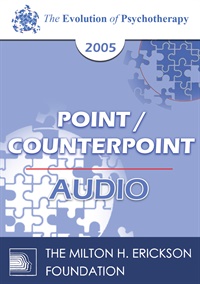
- Average Rating:
- Not yet rated
- Topic Areas:
- Point/Counterpoint Sessions | Trauma | Psychotherapy
- Categories:
- Evolution of Psychotherapy | Evolution of Psychotherapy 2005
- Faculty:
- Michael White, B.A.S.W. | Francine Shapiro, PhD
- Duration:
- 1 Hour 19 Minutes
- Format:
- Audio Only
- Original Program Date:
- Dec 07, 2005
- Short Description:
- This will be a review of consequences of trauma, including a diminished sense of identity associated with loss of personal agency. An approach to the rich development of stories of identity will be described. This results in the restoration of personal agency and provides a sense of personal fullness and intimacy.
- Price:
- $15.00 - Base Price
Tags: Trauma Psychotherapy

- Average Rating:
- Not yet rated
- Topic Areas:
- Point/Counterpoint Sessions | Family Therapy | Social Issues | Managed Care
- Categories:
- Evolution of Psychotherapy | Evolution of Psychotherapy 2005 | Pioneers in Couples and Family Therapy
- Faculty:
- Cloe Madanes, HDL, LIC | Thomas Szasz, MD
- Duration:
- 1 Hour 19 Minutes
- Format:
- Audio Only
- Original Program Date:
- Dec 07, 2005
- Short Description:
- Cloe Madanes highlights the value of prioritizing relationships over individual pathology in family therapy. She critiques the influence of Big Pharma and managed care, warning against overmedication and noting that antidepressants show only a 10% improvement over placebos. Case examples include a suicidal man who regained joy and a young woman with epilepsy who improved through family therapy. Dr. Thomas Szasz adds a libertarian perspective, arguing that mental illness can become a self-fulfilling prophecy shaped by economic and political forces. Moderated by Bernhard Trenkle, Dipl. Psych.
- Price:
- $15.00 - Base Price
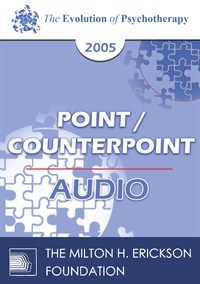
- Average Rating:
- Not yet rated
- Topic Areas:
- Point/Counterpoint Sessions | Psychotherapy | Therapeutic Relationship | Therapist Development
- Categories:
- Evolution of Psychotherapy | Evolution of Psychotherapy 2005
- Faculty:
- Arnold Lazarus, Ph.D. | Ernest Rossi, PhD
- Duration:
- 1 Hour 19 Minutes
- Format:
- Audio Only
- Original Program Date:
- Dec 07, 2005
- Short Description:
- Boundary crossings can be extremely helpful, whereas boundary violations are usually harmful. Therapy is often shortchanged by the tendency to practice defensively. It is imperative not to exploit, disparage, abuse or harass a client. We also must appreciate the significance of confidentiality, integrity, respect and informed consent. All the rest of the ethical rules, codes and regulations are negotiable. Thus, non-sexual dual relationships often can enhance the process and outcome of psychotherapy.
- Price:
- $15.00 - Base Price
- Average Rating:
- Not yet rated
- Topic Areas:
- Point/Counterpoint Sessions | Multicultural | Community | Psychotherapy | Social Issues
- Categories:
- Evolution of Psychotherapy | Evolution of Psychotherapy 2005
- Faculty:
- Jean Houston, PhD | Mary Catherine Bateson, PhD
- Course Levels:
- Master Degree or Higher in Health-Related Field
- Duration:
- 1:19:00
- Format:
- Audio and Video
- Original Program Date:
- Dec 08, 2005
- Short Description:
- This session explores the idea of the therapist as a social artist, someone whose work extends beyond the consulting room into culture, community, and leadership. The faculty examines how therapeutic skills like deep listening, imagination, metaphor, and improvisation can support social healing, ethical action, and collective change in times of global stress. Participants are invited to rethink psychotherapy as both a personal and cultural practice, one that helps individuals and communities adapt, create meaning, and participate more consciously in shaping the world they live in.
- Price:
-
Sale is $29.00
price reduced from Base Price - $59.00
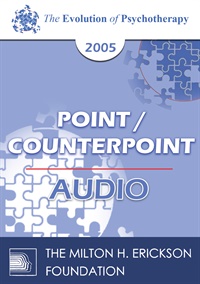
- Average Rating:
- Not yet rated
- Topic Areas:
- Point/Counterpoint Sessions | Psychotherapy | History of Psychotherapy | Systems Theory
- Categories:
- Evolution of Psychotherapy | Evolution of Psychotherapy 2005 | Pioneers in Couples and Family Therapy
- Faculty:
- Salvador Minuchin, MD | John Gottman, PhD | Julie Gottman, PhD
- Duration:
- 1 Hour 19 Minutes
- Format:
- Audio Only
- Original Program Date:
- Dec 08, 2005
- Short Description:
- This session traces the arc of family therapy from its early directive roots to more collaborative, systemic practices. Minuchin reflects on his shift in stance and introduces a four-step assessment model. The Gottmans contribute research-based insights on friendship, conflict, and emotional intelligence in couples, emphasizing tailored approaches and the enduring nature of many relationship challenges.
- Price:
- $15.00 - Base Price
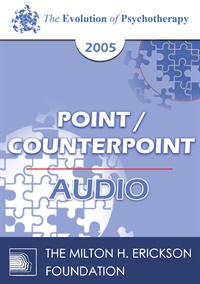
- Average Rating:
- Not yet rated
- Topic Areas:
- Point/Counterpoint Sessions | Abuse | Memory | Psychotherapy | Trauma
- Categories:
- Evolution of Psychotherapy | Evolution of Psychotherapy 2005
- Faculty:
- Francine Shapiro, PhD | Otto Kernberg, MD
- Duration:
- 1 Hour 13 Minutes
- Format:
- Audio Only
- Original Program Date:
- Dec 08, 2005
- Short Description:
- EP05 Point/Counterpoint 09 - Ending the Cycle of Violence - Francine Shapiro, Ph.D. The Adaptive Information Processing model, which guides EMDR, posits that dysfunctional beliefs, emotions and behaviors are often a direct manifestation of etiological events that have been improperly stored in memory. Implications of the model underscore the obligation of our profession to treat both victims and perpetrators of abuse and violence worldwide.
- Price:
- $15.00 - Base Price
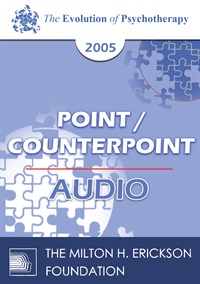
- Average Rating:
- Not yet rated
- Topic Areas:
- Point/Counterpoint Sessions | Psychotherapy | History of Psychotherapy | Life Focus Community
- Categories:
- Evolution of Psychotherapy | Evolution of Psychotherapy 2005
- Faculty:
- Erving Polster, PhD | William Glasser, MD
- Duration:
- 1 Hour 19 Minutes
- Format:
- Audio Only
- Original Program Date:
- Dec 08, 2005
- Short Description:
- Historically, psychotherapists have worked with individuals, small groups, large groups and organizations. We have moved from treating pathology to facilitating personal growth to expanding public consciousness. A next step is the life-long guidance of congregations of people. With religion as a precedent, and large group formation as an instrument, Dr. Polster will show how we may address the everyday, non-pathological needs of the community at large, spelling out some of these procedures and their theoretical underpinnings.
- Price:
- $15.00 - Base Price
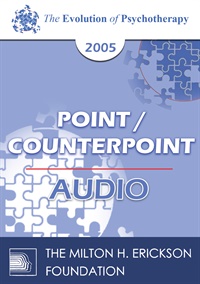
- Average Rating:
- Not yet rated
- Topic Areas:
- Point/Counterpoint Sessions | Divorce | Couples Therapy | Marriage | Psychotherapy
- Categories:
- Evolution of Psychotherapy | Evolution of Psychotherapy 2005
- Faculty:
- John Gottman, PhD | Julie Gottman, PhD | Cloe Madanes, HDL, LIC
- Duration:
- 1 Hour 19 Minutes
- Format:
- Audio Only
- Original Program Date:
- Dec 08, 2005
- Short Description:
- The Gottmans will review research that shows that when the first baby arrives, up to 67% of couples go through a tragic deterioration in the quality of their relationship, which usually begins the cascade toward divorce. Their research outlines the consistent phenomena in this transition, and how the minority of marriages do manage to succeed in avoiding this tragedy. The Gottmans will describe a new approach to the problem and present the results of randomized clinical trial preventative intervention with one-year follow-up data on that intervention.
- Price:
- $15.00 - Base Price
- Average Rating:
- Not yet rated
- Topic Areas:
- Point/Counterpoint Sessions | Narcissism | Personality Disorders | Psychotherapy
- Categories:
- Evolution of Psychotherapy | Evolution of Psychotherapy 2005
- Faculty:
- Otto Kernberg, MD | James F. Masterson, MD
- Course Levels:
- Master Degree or Higher in Health-Related Field
- Duration:
- 1:18:56
- Format:
- Audio and Video
- Original Program Date:
- Dec 08, 2005
- Short Description:
- Indications and contraindications for supportive and psychodynamic approaches to pathological narcissism will be outlined. Essential techniques of these modalities for narcissistic patients will be described, and alternative approaches examined.
- Price:
-
Sale is $29.00
price reduced from Base Price - $59.00

- Average Rating:
- Not yet rated
- Topic Areas:
- Point/Counterpoint Sessions | Neurobiology | Object Relations Theory | Psychotherapy | Attachment | History of Psychotherapy
- Categories:
- Evolution of Psychotherapy | Evolution of Psychotherapy 2005
- Faculty:
- James F. Masterson, MD | Erving Polster, PhD
- Duration:
- 1 Hour 18 Minutes
- Format:
- Audio Only
- Original Program Date:
- Dec 10, 2005
- Short Description:
- This talk first briefly reviews the history of the Developmental, Self and Object Relations theoretical approach to the personality disorders as a preface to exploring the latest additions to the theory, i.e., Attachment Theory and Neurobiological Development of the Self in the Right Brain. Attachment Theory: The work of Ainsworth and others is described leading to the attachment categories in the infant and the adult. Many follow-up studies are presented validating the persistence of the categories over time. Neurobiologic Development of the Self in the Right Brain: The work of Alan Schore, Ph.D. is used to describe the development of the self in the right prefrontal cortex of the brain. Integration: The integration of the two theories with the object relations approach are described and illustrated through therapeutic alliance
- Price:
- $15.00 - Base Price
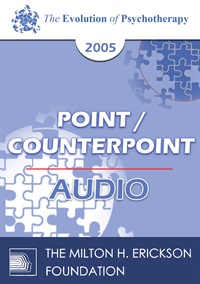
- Average Rating:
- Not yet rated
- Topic Areas:
- Point/Counterpoint Sessions | Hypnosis | Phenomenology | Psychotherapy
- Categories:
- Evolution of Psychotherapy | Evolution of Psychotherapy 2005
- Faculty:
- Jeffrey Zeig, PhD | Marsha Linehan, PhD
- Duration:
- 1 Hour 19 Minutes
- Format:
- Audio Only
- Original Program Date:
- Dec 10, 2005
- Short Description:
- Hypnosis is commonly thought of as a tool to enhance the therapy. It also can be used as a "lens." The phenomenology of hypnosis can help us to understand an essential aspect of the trance state, the symptom state, the solution state and the therapist's state, thereby providing new options for treatment.
- Price:
- $15.00 - Base Price
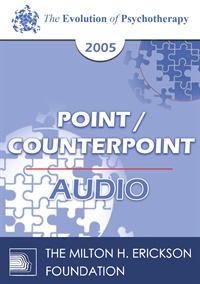
- Average Rating:
- Not yet rated
- Topic Areas:
- Point/Counterpoint Sessions | Law & Ethics | Psychotherapy
- Categories:
- Evolution of Psychotherapy | Evolution of Psychotherapy 2005
- Faculty:
- Thomas Szasz, MD | James Hillman, PhD
- Duration:
- 1 Hour 19 Minutes
- Format:
- Audio Only
- Original Program Date:
- Dec 10, 2005
- Short Description:
- Analysis of the problematic nature of the concepts of mental illness and psychological (verbal) therapy. How psychotherapists influence persons. Examination of the economic, ethical and legal aspects of psychotherapy.
- Price:
- $15.00 - Base Price
Tags: Ethics Law Psychotherapy Thomas Szasz
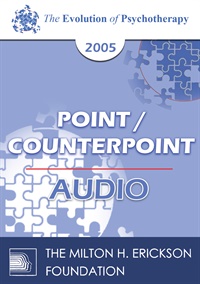
- Average Rating:
- Not yet rated
- Topic Areas:
- Point/Counterpoint Sessions | Psychotherapy | Therapist Development
- Categories:
- Evolution of Psychotherapy | Evolution of Psychotherapy 2005
- Faculty:
- James Hillman, PhD | Donald Meichenbaum, PhD
- Duration:
- 1 Hour 19 Minutes
- Format:
- Audio Only
- Original Program Date:
- Dec 10, 2005
- Short Description:
- The client comes for help because he/she is "deeply" troubled. These "deeps" lurking inside problems need to be spoken about by the client and spoken to by the therapist/counselor. Otherwise practice fails its promise and becomes a bag of tricks for fixing problems.
- Price:
- $15.00 - Base Price
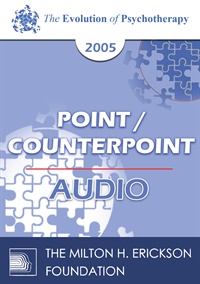
- Average Rating:
- Not yet rated
- Topic Areas:
- Point/Counterpoint Sessions | Anxiety | Psychotherapy
- Categories:
- Evolution of Psychotherapy | Evolution of Psychotherapy 2005
- Faculty:
- Marsha Linehan, PhD | Arnold Lazarus, Ph.D.
- Duration:
- 1 Hour 19 Minutes
- Format:
- Audio Only
- Original Program Date:
- Dec 10, 2005
- Short Description:
- Effective exposure based treatments work via cue exposure, response prevention, and reinforced "opposite action" (all the way). The principles of exposure treatments for anxiety disorders can be generalized to treat disorders of other emotions such as anger, sadness, jealousy, envy, shame and guilt. Opposite action can be taught as a skill.
- Price:
- $15.00 - Base Price
Tags: Anxiety Psychotherapy
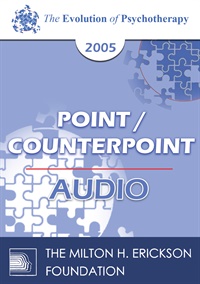
- Average Rating:
- Not yet rated
- Topic Areas:
- Point/Counterpoint Sessions | Aging and Mortality | Psychotherapy | Family Therapy
- Categories:
- Evolution of Psychotherapy | Evolution of Psychotherapy 2005
- Faculty:
- Mary Goulding, MSW | Salvador Minuchin, MD
- Duration:
- 1 Hour 19 Minutes
- Format:
- Audio Only
- Original Program Date:
- Dec 10, 2005
- Short Description:
- The emotional problems, physical impairments, financial difficulties and, especially, how does someone nearing death cope with the belief that the world has become so much less caring and altruistic than it was in much of the previous century.
- Price:
- $15.00 - Base Price
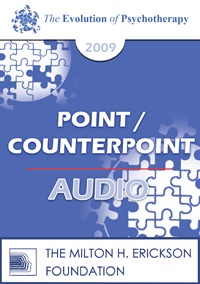
- Average Rating:
- Not yet rated
- Topic Areas:
- Point/Counterpoint Sessions | Psychotherapy | Therapist Development
- Categories:
- Evolution of Psychotherapy | Evolution of Psychotherapy 2009
- Faculty:
- Donald Meichenbaum, PhD
- Duration:
- 1 Hour 23 Minutes
- Format:
- Audio Only
- Original Program Date:
- Dec 09, 2009
- Short Description:
- A major challenge for any skills-oriented intervention is the issue of treatment generalization. Psychotherapists cannot just “train and hope” for transfer. In this presentation, Dr. Meichenbaum will discuss and demonstrate what needs to be done before, during and after interventions to make them more effective. He will discuss specific steps that psychotherapists should take to increase the likelihood of maintenance and generalization across settings and across response domains.
- Price:
- $15.00 - Base Price
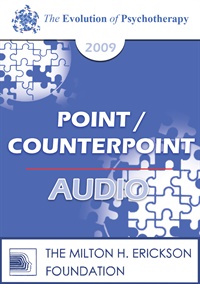
- Average Rating:
- Not yet rated
- Topic Areas:
- Point/Counterpoint Sessions | Trauma | Eye Movement Desensitization and Reprocessing (EMDR) | Psychotherapy
- Categories:
- Evolution of Psychotherapy | Evolution of Psychotherapy 2009
- Faculty:
- Francine Shapiro, PhD
- Duration:
- 1 Hour 8 Minutes
- Format:
- Audio Only
- Original Program Date:
- Dec 09, 2009
- Short Description:
- EMDR has been used worldwide over the past decade as an empirically validated trauma treatment. During that time, it has become clear that it is possible to simultaneously alleviate suffering, help stop the cycle of violence, and address the devastating effects of trans-generational transmission. The clinical implications for simple symptom reduction versus personal growth and resiliency will be explored.
- Price:
- $15.00 - Base Price
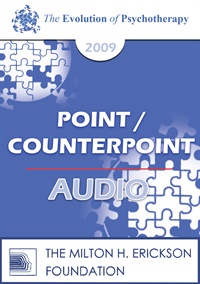
- Average Rating:
- Not yet rated
- Topic Areas:
- Point/Counterpoint Sessions | Narcissism | Personality Disorders | Psychotherapy
- Categories:
- Evolution of Psychotherapy | Evolution of Psychotherapy 2009
- Faculty:
- Otto Kernberg, MD
- Duration:
- 1 Hour 30 Minutes
- Format:
- Audio Only
- Original Program Date:
- Dec 09, 2009
- Short Description:
- Dr. Kernberg will present prognostically unfavorable indications for a psychodynamic psychotherapy of narcissistic patients, and the management of the corresponding difficulties. The description of general characteristics of narcissistic personality disorder, clinical syndromes including the diagnosis, and general principles of psychodynamic therapy for them will compliment this presentation.
- Price:
- $15.00 - Base Price
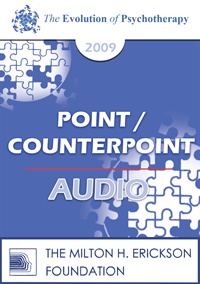
- Average Rating:
- Not yet rated
- Topic Areas:
- Point/Counterpoint Sessions | Life Focus Community | Psychotherapy | Religion
- Categories:
- Evolution of Psychotherapy | Evolution of Psychotherapy 2009
- Faculty:
- Erving Polster, PhD
- Duration:
- 1 Hour 28 Minutes
- Format:
- Audio Only
- Original Program Date:
- Dec 10, 2009
- Short Description:
- Psychotherapy, an originally private medical procedure, faces two immediate challenges: 1) an asocial pharmaceutical ethos and 2) its own populist success, which now call out for a more inclusive format. The latter represents a growing option for life-long large groups tapping the innermost sensibilities of people and creating the embodiment of belonging.
- Price:
- $15.00 - Base Price
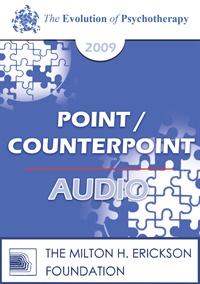
- Average Rating:
- Not yet rated
- Topic Areas:
- Point/Counterpoint Sessions | Psychotherapy | Genomics | Neuroscience
- Categories:
- Evolution of Psychotherapy | Evolution of Psychotherapy 2009
- Faculty:
- Ernest Rossi, PhD
- Duration:
- 1 Hour 3 Minutes
- Format:
- Audio Only
- Original Program Date:
- Dec 10, 2009
- Short Description:
- Revolutionary research in neuroscience and functional genomics documents show experiences of 1) Novelty, 2) Environmental Enrichment, and 3) Exercise (both mental and physical) can optimize gene expression, brain plasticity and mindbody healing during therapeutic hypnosis and meditation.
- Price:
- $15.00 - Base Price
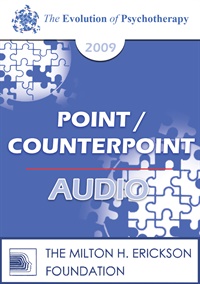
- Average Rating:
- Not yet rated
- Topic Areas:
- Point/Counterpoint Sessions | Psychotherapy | Social Psychology
- Categories:
- Evolution of Psychotherapy | Evolution of Psychotherapy 2009
- Faculty:
- Albert Bandura
- Duration:
- 1 Hour 24 Minutes
- Format:
- Audio Only
- Original Program Date:
- Dec 10, 2009
- Short Description:
- This session stages a searching exchange on moral disengagement, asking how ordinary people, institutions, and even helping professions drift into justifying harm. Through theory, case examples, and pointed critique, it examines dehumanization, responsibility, power, and the ethical blind spots that show up in war, corporations, media, mental health, and family systems. The dialogue challenges therapists and students to examine their own practices, rethink neutrality, and consider how psychological ideas can either protect human dignity or quietly erode it.
- Price:
- $15.00 - Base Price


